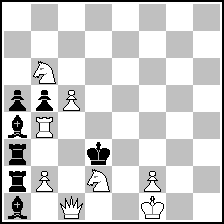|
|
| (1) Posted by Eugene Rosner [Sunday, Aug 27, 2017 02:37] |
a question!
What is the definition of a Lithuanian Nowotny?
|
|
| (2) Posted by Darko Šaljić [Sunday, Aug 27, 2017 09:33] |
You mean Latvian?
I hope there is no one more :)
|
|
| (3) Posted by Hauke Reddmann [Sunday, Aug 27, 2017 11:26] |
Never heard about the Estonian Nowotny? I thought so. Nobody Keres. :-)
|
|
| (4) Posted by Darko Šaljić [Sunday, Aug 27, 2017 11:42] |
Please, don't give them idea :)
|
|
| (5) Posted by Eugene Rosner [Sunday, Aug 27, 2017 14:39] |
Yes, it is Latvian after all. And I do know this one!Thanks for everyone's help!
|
|
| (6) Posted by Darko Šaljić [Sunday, Aug 27, 2017 16:29]; edited by Darko Šaljić [17-08-27] |
Sorry.
As I remember, white piece is already on interfence square. After the key move, white threats both thematic Nowotny mates,
and both mates are separated after capturing this piece by black.
|
|
| (7) Posted by Geoff Foster [Monday, Aug 28, 2017 00:13] |
Has a Lithuanian Nowotny been done with black Organ Pipes?
|
|
| (8) Posted by Darko Šaljić [Monday, Aug 28, 2017 10:33] |
I'm sure it does not exist in ortodox #2
|
|
| (9) Posted by seetharaman kalyan [Monday, Aug 28, 2017 19:53]; edited by seetharaman kalyan [17-08-28] |
QUOTE
Sorry.
As I remember, white piece is already on interfence square. After the key move, white threats both thematic Nowotny mates,
and both mates are separated after capturing this piece by black.
Is that not Finnish Novotny?
|
|
| (10) Posted by Viktoras Paliulionis [Monday, Aug 28, 2017 21:51] |
Definition from Encyclopedia of Chess Problems:
Nowotny, Latvian
This term is used for two quite different things:
1. In the initial position there is a white piece on the cutting point. The key, made by another white piece, triggers the double threat and takes advantage of both interferences.
2. The thematic white unit moves onto the interception point of a black Rook and Bishop, or stands there ready in the diagram position. The double threat does not become actual until another white man moves.
|
|
| (11) Posted by seetharaman kalyan [Monday, Aug 28, 2017 22:25] |
Sorry. Finnish Novotny is when a black man is in the intersection point and white piece captures to create the Novotny setting.
|
|
| (12) Posted by Jacques Rotenberg [Tuesday, Aug 29, 2017 06:29] |
@ Geoff and @ Darko
Jacques Savournin
Smer 1963 (version 1992)
4th Prize
 (= 7+12 ) (= 7+12 )
2#
1.Rf2! [2.Rg3,Qe2,Qg3,Q×d4,Qe6‡]
1…B×f2 2.Qe6‡
1…B×g2 2.Qg3‡
1…R×f2 2.Rg3‡
1…R×g2 2.Q×d4‡
also
1…Qh4,Q×h6 (1...Q~) 2.Qe2‡
1…Qh3!? 2.Q×g5‡
|
|
| (13) Posted by Jacques Rotenberg [Tuesday, Aug 29, 2017 06:43] |
also
Jacques Savournin
La Bataille 1949
 (= 8+7 ) (= 8+7 )
2#
1.Sb3! [2.Qd2,Rd4,Qc3,Qd1,Qb1‡]
1…B×b2 2.Qd2‡
1…R×b2 2.Rd4‡
1…B×b3 2.Qc3‡
1…R×b3 2.Qd1‡
1…a×b4 2.Qb1‡
|
|
| (14) Posted by Darko Šaljić [Tuesday, Aug 29, 2017 09:03] |
Thank you Jacques!
Very nice concept with natural total Fleck.
|
|
| (15) Posted by Harri Hurme [Thursday, Aug 31, 2017 00:04] |
About the Finnish Nowotny.
It is kind of "logical" theme, in true form it requires also that there is a thematical try, which does not capture the pawn in the intersection point. The try must be defeated by moving the pawn opening the lines for rook and bishop. And the solution is capturing the pawn.
Also the Finnish Plachutta must have a noncapturing try, which is defeated by moving the pawn away from the intersection point. Many ignore the tries, but they are not experts.
Harri
|
|
| (16) Posted by Marjan Kovačević [Wednesday, Sep 13, 2017 03:06] |
Another beautiful example:
http://prntscr.com/gkfoba
1.Nf7! (2.Qe5#/Qf5#/Qg5#/Qd2#/Nh5#)
1...c5 2.Qd2#
1...Rxf7 2.Nh5#
1...Rxg7 2.Qe5#
1...Bxf7 2.Qf5#
1...Bxg7 2.Qg5#
|
|
| (17) Posted by Eugene Rosner [Wednesday, Sep 13, 2017 16:33] |
indeed, a very pretty 5-fold primary Fleck-I believe the composer excelled at these?
|
|
| (18) Posted by Jacques Rotenberg [Friday, Sep 15, 2017 00:27] |
Let's give the diagram :
Hilding Froberg (Johan Hilding Laurencius Fröberg)
Göteborgs posten (Göteborg Schacksällskap) 1951
5th Prize
 (= 7+8 ) (= 7+8 )
2#
This was built again some 53 years later, lighter :
Gerard Bouma
Probleemblad 2004
 (= 6+7 ) (= 6+7 )
2#
1.Sc7! [2.Qb5,Qc5,Qd5,Qd3,Sa5‡]
1…B×c7 2.Qc5‡
1…R×c7 2.Sa5‡
1…B×b7 2.Qb5‡
1…R×b7 2.Qd5‡
1…d3+ 2.Q×d3‡
Bouma abandoned the mirror mates but introduced a pair of important tries :
1.Sb4? [2.Qd3‡, 2.Qd5‡]
but 1…B×b7!
1.a4? [2.Qb5‡]
1…Rc5 2.Q×c5‡
1…d3+ 2.Q×d3‡
but 1…R×b7!
that underlines the set Novotny feature
(in the Froberg's version 1.Sg4? exists but 1.h4? has two refutations)
To complete this, perhaps is it worth noting a 3rd version showing the problem with a 6-mate Fleck :
J.C. Van Gool
Probleemblad 1978
Special Prize
 (= 11+14 ) (= 11+14 )
2#
1.Sb5! [2.Sd3‡, 2.Qd4‡, 2.Qd5‡, 2.Qd6‡, 2.Qf6‡, 2.Qc7‡]
1…B×b4 2.Qd4‡
1…R×b4 2.Qd6‡
1…B×b5 2.Qd5‡
1…R×b5 2.Sd3‡
1…Sd7 2.Qc7‡
1…d1=Q 2.Qf6‡
if you consider that there is no need to take in account the underpromotions, this is a perfect Fleck.
|
|
| (19) Posted by Eugene Rosner [Friday, Sep 15, 2017 01:59] |
nice thread folks! and many thanks to Jacques for his excellent elaboration on this particular Latvian matrix!
|
|
No more posts |
MatPlus.Net  Forum Forum  General General  a question! a question! |
 ISC 2024
ISC 2024 Forum
Forum  General
General  a question!
a question! 


